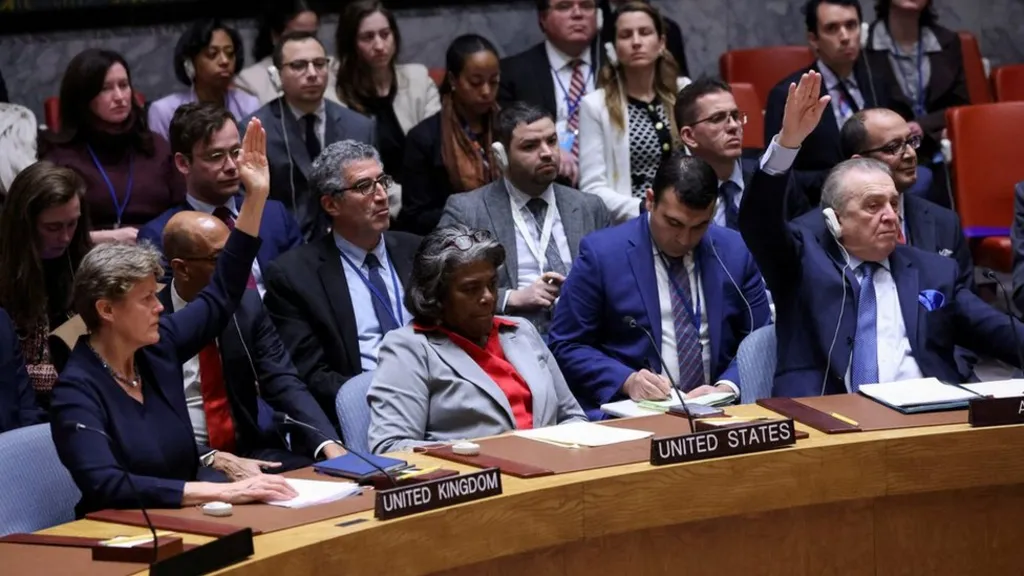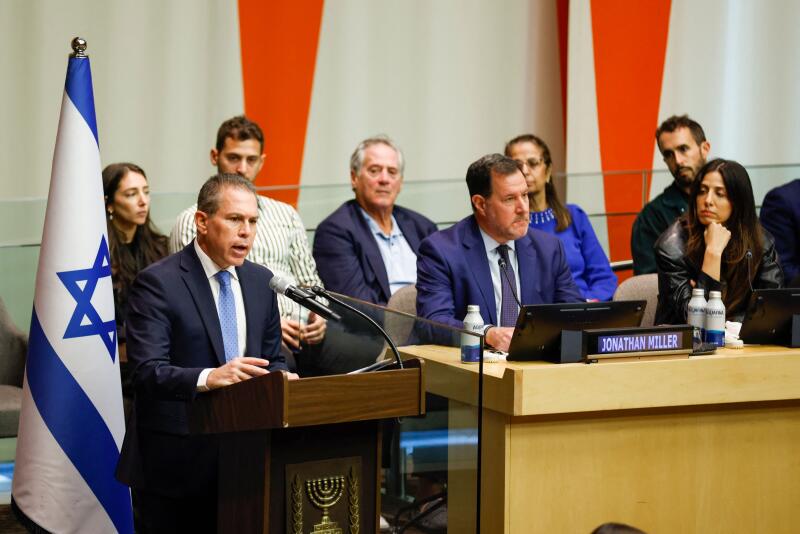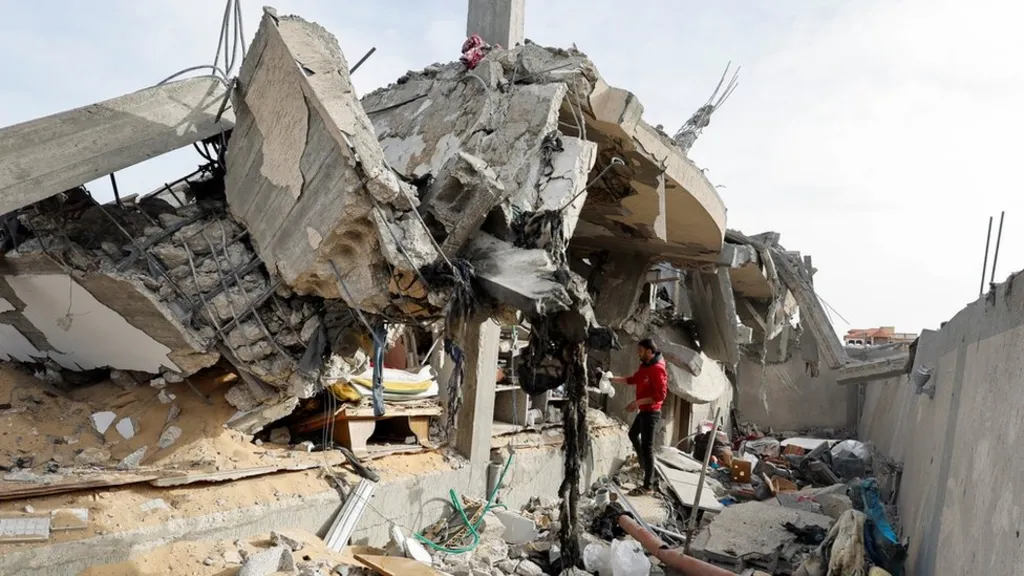Israel claims that the fact that Hamas turned down its latest offer for an agreement on a Gaza truce with Israel demonstrates the “damage” caused by the UN Security Council resolution calling for an immediate ceasefire.
The office of Prime Minister Benjamin Netanyahu declared that Israel will not yield to the “delusional demands” of the Palestinian armed organization.
Among them are the cessation of hostilities and the total evacuation of Israeli soldiers.
The Israeli statement was deemed “inaccurate in almost every respect” by the United States.
According to a spokeswoman for the state department, Hamas had prepared their rebuttal before to Monday’s Security Council decision.
Meanwhile, the Israeli military announced that it had verified the death of Marwan Issa, the deputy head of Hamas’s military branch, in an attack on a tunnel system under the Nuseirat camp for refugees around two weeks prior.
“We have examined all of the intelligence,” Rear Admiral Daniel Hagari, the spokesperson, stated. “Marwan Issa was eliminated in the strike.”
Izzat al-Rishq, a political official for Hamas, declared that the group’s military leadership would have the “final say” and expressed “no confidence” in the Israeli assertion.
Issa, according to Rear Admiral Hagari, was “number three” in the group and “one of the organizers” of Hamas’s October 7 onslaught on southern Israel, which resulted in the deaths of over 1,200 people and the kidnapping of 253 more.
https://youtu.be/9l5JILVwick?si=RNFAg5xpPdS5QwLu
According to the health ministry administered by Hamas, more than 32,400 people have died in Gaza since then, including 81 in the last 24 hours.
-
Bowen: UN rights expert charges Israel of genocide
-
Biden decides that harsh words are insufficient
After months of impasse over the matter, the UN Security Council finally issued a resolution calling for an immediate ceasefire in the Gaza War, to which Israel responded angrily.

The document, which also called for the immediate increase of humanitarian relief delivery and the unconditional release of all remaining captives, was approved by 14 council members, including the UK.
The resolution drew criticism from the US, Israel’s strongest military backer, for not denouncing Hamas for the October 7 assault.
But the US refrained, declaring that it fully backed the war’s main goals, a hint of growing dissatisfaction with Israel’s tactics.
Israel canceled a delegation’s trip to Washington to discuss its next ground attack in the southern city of Rafah, where over a million Palestinians have taken refuge, in protest. The United States has cautioned that a full-scale attack may result in a humanitarian crisis.
Later, at indirect negotiations in Doha, mediators from the US, Qatar, and Egypt presented the most recent cease-fire proposal. Hamas responded with a statement that it rejected.
The organization declared that it would not budge from its initial demands, which called for “a permanent ceasefire that would lead to a full withdrawal” of Israeli soldiers from Gaza and the repatriation of Palestinians who had been displaced.
According to the Israeli prime minister’s office, Hamas’s position “clearly demonstrates its utter disinterest in a negotiated deal and attests to the damage done by the UN Security Council’s resolution” on Tuesday morning.
“Israel will not address Hamas’s delusional demands,” it stated. “Israel will pursue and achieve its just war objectives: Destroying Hamas’s military and governmental capacities, release of all the hostages, and ensuring Gaza will not pose a threat to the people of Israel in the future.”
However, Matthew Miller, a spokesman for the US State Department, dismissed the critique.

He told reporters in Washington, “That statement is unfair to the hostages and their families and it is inaccurate in almost every respect.”
The public’s understanding of Hamas’s response has been derived entirely from press reporting. It has nothing to do with the response’s actual content. I can confirm that the reaction was formulated before to the UN Security Council vote, rather than following it.”
Majed al-Ansari, a spokesperson for Qatar’s foreign ministry, stated during a press conference in Doha that the indirect negotiations “are ongoing, they have not stopped”.
“We are continuing with our partners in mediation efforts, but there is no timeline for discussions,” he stated, noting that they were now occurring “at the level of technical teams”.
After ten days of negotiations, Israeli officials were quoted by Israeli media and the news agency Reuters as claiming that Israel has summoned in its negotiating team from Qatar.
Ismail Haniyeh, the political head of Hamas, said that the resolution demonstrated Israel’s “unprecedented political isolation” while on a visit to Iran, a country that supplies and finances the organization.
A week-long truce in late November saw the release of 105 hostages in exchange for some 240 Palestinian detainees held in Israeli prisons.
The most recent agreement that Hamas allegedly rejected called for up to 800 Palestinian inmates in exchange for a six-week ceasefire in hostilities and the release of 40 of the group’s remaining captives.
The fighting on the ground in Gaza showed no signs of abating, with reports of several Palestinian deaths from Israeli airstrikes.
Nine children were among the at least eighteen persons who died in a strike on a residential structure on the outskirts of Rafah, according to Palestinian media and local health officials. They said that the Abu Naqira family owned the house in the Musabah neighborhood, where scores of internally displaced persons had sought refuge.
About thirty individuals were slain in an attack on a family compound close to Gaza City’s al-Shifa hospital, according to family members of Abu Hasira who spoke with the Reuters news agency from northern Gaza.
Following a 24-hour period, the Israeli military claimed to have targeted 60 targets, including “terror tunnels, terrorist infrastructure, and military structures in which armed terrorists were identified.”
In addition, it stated that eight days after starting an attack on combatants from Islamic Jihad and Hamas who it claimed had reassembled in the al-Shifa hospital region, Israeli forces were “continuing to conduct precise operational activity in the area”.
Patients, medics, and displaced residents who are confined inside with limited supplies are allegedly in danger because to the intense conflict, according to Palestinians and relief organizations. According to the military, no civilians have been hurt and 175 “terrorists” have been killed.
Amid fears of an impending famine in Gaza, the Hamas-run government media office in the region announced on Tuesday that eighteen Palestinians had lost their lives while attempting to gather assistance that had been airdropped over the northern region.
A statement said that twelve persons perished in the water after going into the water to grab food packages. According to the statement, the last six were killed by “stampedes” after further relief supplies fell to the ground.
No more information on the occurrences was included in the statement. On the other hand, footage from Monday’s airdrop off a beach close to the northern town of Beit Lahia appeared to show at least one person drowning.
According to Reuters, the Pentagon confirmed that three out of the eighteen assistance packages that were airdropped by US planes over northern Gaza on Monday went into the water due to parachute problems, but they were unable to determine if any people were killed.
According to the prisoner and Missing Families Forum, another event was that the IDF notified the family of Israeli prisoner Uriel Baruch that he had been slain and that Hamas was holding his body.
The 35-year-old father of two was hurt in the attack on the Supernova music festival on October 7 and was also taken hostage.
In the meanwhile, a female captive who was freed in November claimed to the New York Times that a guard in Gaza had sexually harassed her while holding a pistol to her head.
According to the publication, Amit Soussana, 40, is the first former captive to come out and admit that she suffered sexual assault while in captivity.

